Sicily
Sicily
Lombardy
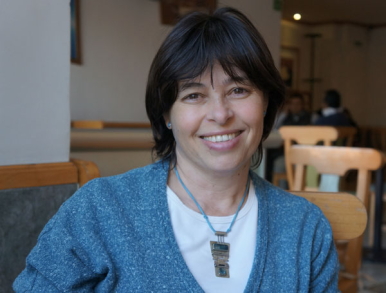
Colombia: people capable of peace

Cristina Montoya
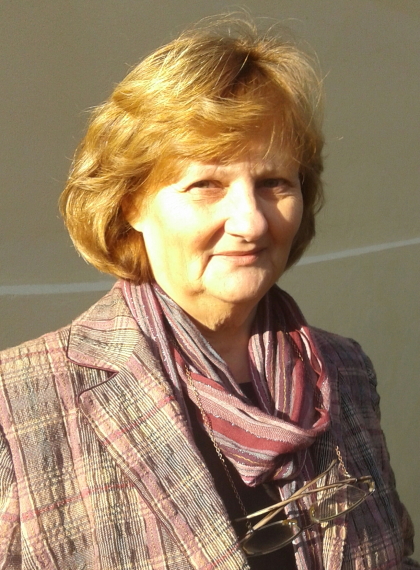
The Balkan War: Chiara was at our side
With the fall of the Berlin Wall everything seemed resolved. No one imagined that the walls of mistrust, hatred and prejudice stood on in the former Yugoslavia, impeding what for so many years the Focolare communities had been trying to build: unity among all, differences of differences ethnicity, language and religion. They saw the diversity as enrichment. The announcement of the conflict was a real shock to them, but also an incentive to continue believing that despite the absurdity of fratricidal war, God’s love had not diminshed.  Minka Fabjan, expert in administration and active in the field of the Economy of Communion, reports on behalf of the community in Zagabria: “It was August 1991 and, amidst a thousand hardships, a group of us went to Katowice, Poland, because we learned that Chiara Lubich was going to be there. She invited us to testify to the Gospel in every possible way, to ‘shout it from the rooftops’. There were already the first rumblings of war in Croatia: closed schools, blocked highways . . . Amidst winds of war, it was striking to hear our messages of peace which, at the urging of Chiara, we sent to various public broadcasters. Nevertheless, her messages became more intense: “Demonstrate with your life that love conquers all.” She had been the one to suggest that we collect signatures for peace: “in schools, in front of churches, on public squares, in Slovenia, Serbia and everywhere. Because of the air raids, in Croatia we even gathered signatures in the air raid shelters. Within a few days we sent them off to several Heads of State, 65,000 signatures.” “Meanwhile our houses filled up with refugees: they were relatives and friends, but also strangers. Therefore, Chiara invited the Movement around the world to become involved in sending help. The first truckload arrived in autumn. It contained foodstuffs and basic necessities, and that continued for years. Red Cross centres, conference halls, houses in the middle of construction and cellars were transformed into storerooms, so that the goods could be shared with neighbours and refugees both Serbian, Muslim and Christian. We prepared up to 300 packages a day. With this humanitarian aid we managed to provide relgular help to 7000 people.” “We were already feeling tired when, in 1993, Pope John Paul II asked us to open our hearts and homes to the Bosnian women who were arriving from Zagabria, following the unspeakable cruelties suffered in the camps. We felt like Chiara was beside us and so we all got to work. During the 1993 Familyfest, we launched a fundraising campaign that allowed us to give homes to 50 refugee families and to help more than 150 women. Through adoption at a distance, thousands of children were provided for. Several rape victims found the heroic strength to carry the pregnancy to term. In Serbia 700 men – including members of the Movement – were drafted into the federal army. When Chiara heard of it she invited all of us to pray for them, that they would find the courage to oppose violence and not fire their weapons. And those prayers were quickly answered because all of our men were given civil service duties.” The war had also involved Kosovo and Belgrade. Nevertheless, Chiara wanted to visit an area near Croatia. When Večernji list journalist, Ottone Novosel, asked her if she had any words for the people, Chiara didn’t hesitate: “Show that the miracle of unity is possible even among different ways of thinking, different ethnic groups, and different religions. This war could provoke another reaction, a great flowing of love that could become a model for many other populations. God is the one who guides history ” (April 12, 1999). Her words continue to be timely as we consider the many conflicts that still plague our planet and dishonour our common humanity.
Minka Fabjan, expert in administration and active in the field of the Economy of Communion, reports on behalf of the community in Zagabria: “It was August 1991 and, amidst a thousand hardships, a group of us went to Katowice, Poland, because we learned that Chiara Lubich was going to be there. She invited us to testify to the Gospel in every possible way, to ‘shout it from the rooftops’. There were already the first rumblings of war in Croatia: closed schools, blocked highways . . . Amidst winds of war, it was striking to hear our messages of peace which, at the urging of Chiara, we sent to various public broadcasters. Nevertheless, her messages became more intense: “Demonstrate with your life that love conquers all.” She had been the one to suggest that we collect signatures for peace: “in schools, in front of churches, on public squares, in Slovenia, Serbia and everywhere. Because of the air raids, in Croatia we even gathered signatures in the air raid shelters. Within a few days we sent them off to several Heads of State, 65,000 signatures.” “Meanwhile our houses filled up with refugees: they were relatives and friends, but also strangers. Therefore, Chiara invited the Movement around the world to become involved in sending help. The first truckload arrived in autumn. It contained foodstuffs and basic necessities, and that continued for years. Red Cross centres, conference halls, houses in the middle of construction and cellars were transformed into storerooms, so that the goods could be shared with neighbours and refugees both Serbian, Muslim and Christian. We prepared up to 300 packages a day. With this humanitarian aid we managed to provide relgular help to 7000 people.” “We were already feeling tired when, in 1993, Pope John Paul II asked us to open our hearts and homes to the Bosnian women who were arriving from Zagabria, following the unspeakable cruelties suffered in the camps. We felt like Chiara was beside us and so we all got to work. During the 1993 Familyfest, we launched a fundraising campaign that allowed us to give homes to 50 refugee families and to help more than 150 women. Through adoption at a distance, thousands of children were provided for. Several rape victims found the heroic strength to carry the pregnancy to term. In Serbia 700 men – including members of the Movement – were drafted into the federal army. When Chiara heard of it she invited all of us to pray for them, that they would find the courage to oppose violence and not fire their weapons. And those prayers were quickly answered because all of our men were given civil service duties.” The war had also involved Kosovo and Belgrade. Nevertheless, Chiara wanted to visit an area near Croatia. When Večernji list journalist, Ottone Novosel, asked her if she had any words for the people, Chiara didn’t hesitate: “Show that the miracle of unity is possible even among different ways of thinking, different ethnic groups, and different religions. This war could provoke another reaction, a great flowing of love that could become a model for many other populations. God is the one who guides history ” (April 12, 1999). Her words continue to be timely as we consider the many conflicts that still plague our planet and dishonour our common humanity.
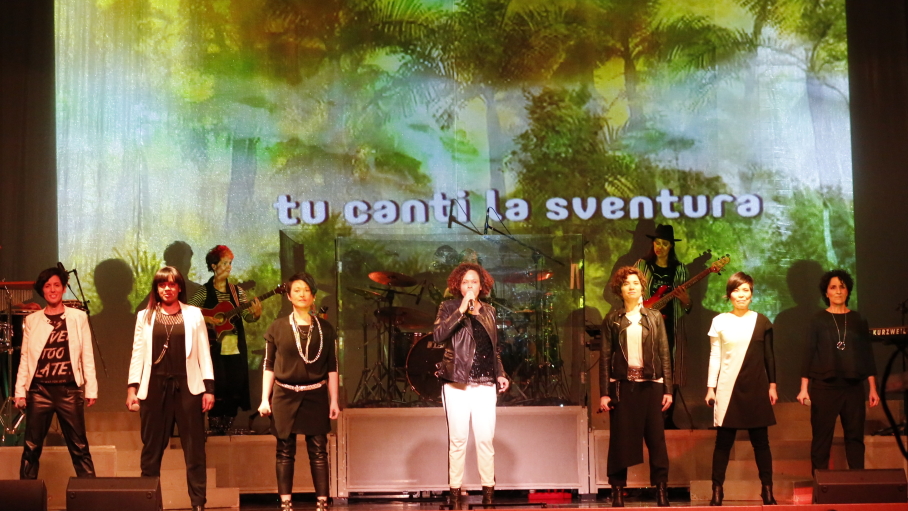
Voices Joining For Peace
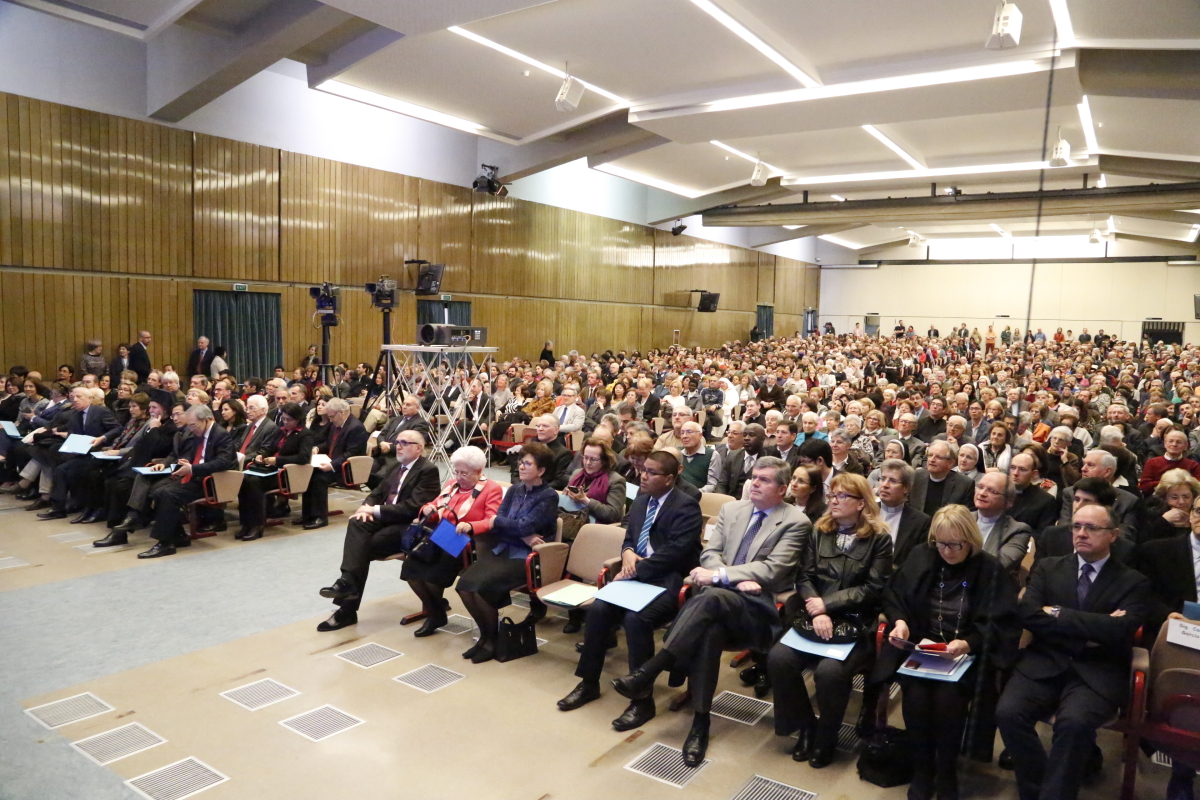 The spirituality of unity born of Chiara Lubich holds a strong relevance for peace. This was the main message of an event at Castel Gandolfo, Italy, on March 12, 2016 at which people came together to reconsider the heritage of Chiara Lubich in the field of peace building. In attendance were ambassadors and representatives of the diplomatic corps to the Holy See and to the Italian State from 20 countries: Morocco, Libya, Benin, Gabon Turkey, Taiwan, Argentina, Venezuela, Cuba, Uruguay, Paraguay, USA, Guatemala, and several European nations like Ukraine, Lithuania, Albania, Slovenia, Portugal and Malta.
The spirituality of unity born of Chiara Lubich holds a strong relevance for peace. This was the main message of an event at Castel Gandolfo, Italy, on March 12, 2016 at which people came together to reconsider the heritage of Chiara Lubich in the field of peace building. In attendance were ambassadors and representatives of the diplomatic corps to the Holy See and to the Italian State from 20 countries: Morocco, Libya, Benin, Gabon Turkey, Taiwan, Argentina, Venezuela, Cuba, Uruguay, Paraguay, USA, Guatemala, and several European nations like Ukraine, Lithuania, Albania, Slovenia, Portugal and Malta. 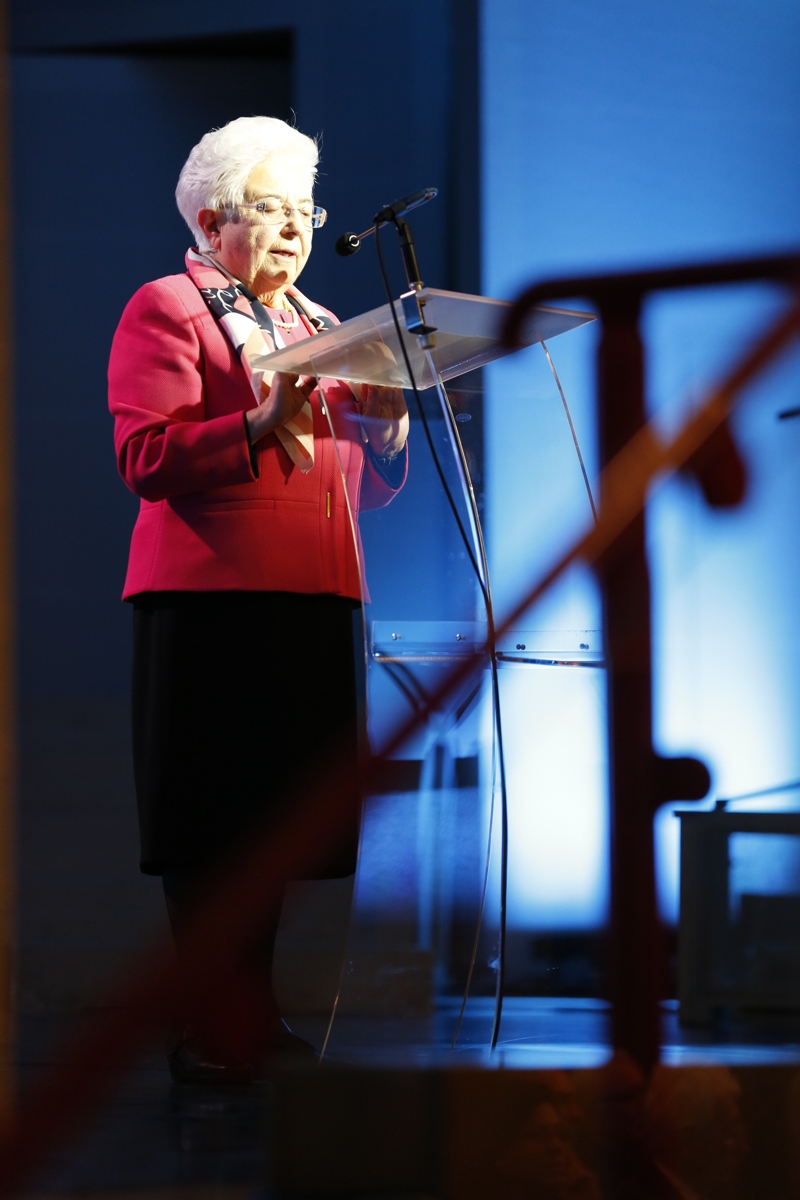 Yet, the current picture which imposes itself on our gaze offers images of a “a peace that is violated and often derided” leading us to believe that “the generations of the Third Millennium will never have an experience of life together in peace.” These were the words of Focolare president, Maria Voce in her welcoming remarks. How can we retie the broken thread of human relationships among peoples and States? “At the UNESCO headquarters, Chiara Lubich had presented a method of Peace Education,” Maria Voce recalled. It was the spirituality of unity, which lays the foundations for a culture of dialogue. This was demonstrated by 4 experiences: the simplicity of the Cube of Peace which became the basis for the development of Living Peace, a project in Cairo schools that has reached 300 schools in 110 countries involving an additional 1000 children and teenagers; dialogue between Christians and Muslims in Italy against the backdrop of tension that spreads across the continent; the “miraculous” story of Fontem, Cameroon, in which Chiara Lubich foresaw the future unity amongst the peoples foreshadowed in a pact that was sealed between the chiefs of the two tribes; and then her grand dream of influencing society through culture and thought, which has led to the founding of the Sophia University Institute, Loppiano, Italy.
Yet, the current picture which imposes itself on our gaze offers images of a “a peace that is violated and often derided” leading us to believe that “the generations of the Third Millennium will never have an experience of life together in peace.” These were the words of Focolare president, Maria Voce in her welcoming remarks. How can we retie the broken thread of human relationships among peoples and States? “At the UNESCO headquarters, Chiara Lubich had presented a method of Peace Education,” Maria Voce recalled. It was the spirituality of unity, which lays the foundations for a culture of dialogue. This was demonstrated by 4 experiences: the simplicity of the Cube of Peace which became the basis for the development of Living Peace, a project in Cairo schools that has reached 300 schools in 110 countries involving an additional 1000 children and teenagers; dialogue between Christians and Muslims in Italy against the backdrop of tension that spreads across the continent; the “miraculous” story of Fontem, Cameroon, in which Chiara Lubich foresaw the future unity amongst the peoples foreshadowed in a pact that was sealed between the chiefs of the two tribes; and then her grand dream of influencing society through culture and thought, which has led to the founding of the Sophia University Institute, Loppiano, Italy.  Gen Verde also spoke from the stage of the Mariapolis Centre in Castel Gandolfo. Their songs from the new On the Other Side Show sing the same stories: the sacrifice of the monks in Tibhirine, Algeria, the lullaby for the nameless child who drowned during one of many voyages of hope, Salvadoran bishop Oscar Romero’s voice for truth, now Blessed, murdered at the hand of a criminal, the cry of the Amazon forest that impoverishes us all. Gen Verde works to build peace in its many workshops for thousands of young people. Those young people choose to be the first sprouts of a new people wherever they find themselves, the sprouts of a more supportive world for the smallest and poorest. This is what Chiara had said at UNESCO when she spoke of a “united world” and she also told how to do it: having courage to suffer, accepting the suffering and fatigue that it requires. “If more people accepted suffering out of love, the suffering demanded by love,” Chiara said, “that would be the most powerful arm for giving back humanity its true dignity: not that of a collection of peoples, one next to the other, often at war – but one people.”
Gen Verde also spoke from the stage of the Mariapolis Centre in Castel Gandolfo. Their songs from the new On the Other Side Show sing the same stories: the sacrifice of the monks in Tibhirine, Algeria, the lullaby for the nameless child who drowned during one of many voyages of hope, Salvadoran bishop Oscar Romero’s voice for truth, now Blessed, murdered at the hand of a criminal, the cry of the Amazon forest that impoverishes us all. Gen Verde works to build peace in its many workshops for thousands of young people. Those young people choose to be the first sprouts of a new people wherever they find themselves, the sprouts of a more supportive world for the smallest and poorest. This is what Chiara had said at UNESCO when she spoke of a “united world” and she also told how to do it: having courage to suffer, accepting the suffering and fatigue that it requires. “If more people accepted suffering out of love, the suffering demanded by love,” Chiara said, “that would be the most powerful arm for giving back humanity its true dignity: not that of a collection of peoples, one next to the other, often at war – but one people.”
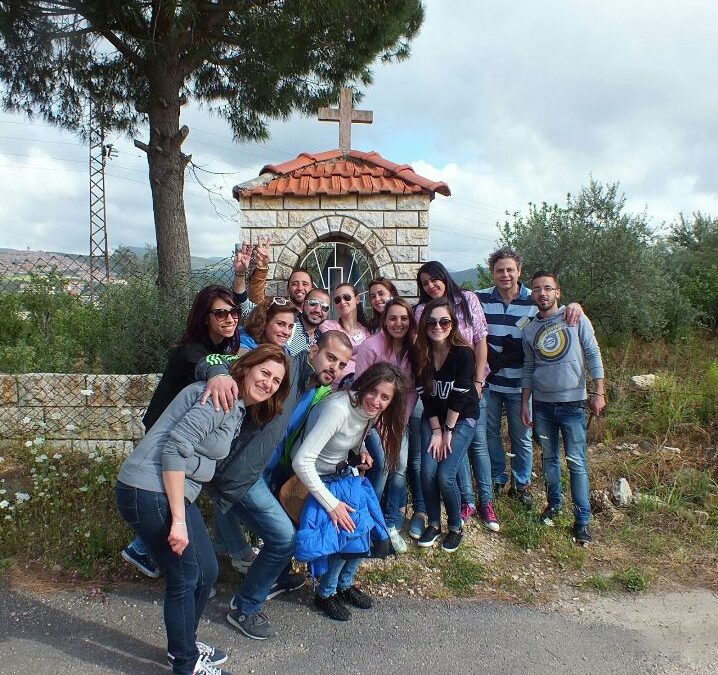
Syria. God overcomes Evil
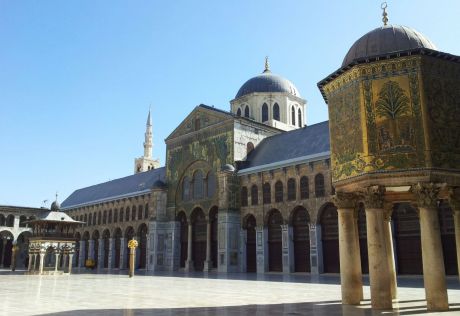 Aleppo, March 8, 2016. I woke up at four in the morning to the sound of bombs and wasn’t able to go back to sleep. I tried not to believe my ears. No, it can’t be true, Lord! More bombings! Just as we were beginning to hope things would get better, that the electricity had returned after 5 months and the water after 45 days! Why? This ceasefire was supposed to last and become permanent! My pleadings rose from the depths of my soul to the Lord of History, asking that this truce which was announced a week ago for all Syria would become permanent. But the sound of fighting on the frontlines that divide the city of Aleppo in two only increased, with the sound of loud explosions that are easily heard at night. While waiting for the sun to rise and for calm to return, as I continued praying I thought: “Of course, we all want Peace, but do we really believe or think that it is achieved at such a high price? There are people who think that war is the path to follow! They’re prepared to sacrifice not only their own lives, but also those of others because they believe this. And there are powers that make a profit on everything that’s happening, so they don’t want the war to end and; indeed, they continue to pour gas on the fire.
Aleppo, March 8, 2016. I woke up at four in the morning to the sound of bombs and wasn’t able to go back to sleep. I tried not to believe my ears. No, it can’t be true, Lord! More bombings! Just as we were beginning to hope things would get better, that the electricity had returned after 5 months and the water after 45 days! Why? This ceasefire was supposed to last and become permanent! My pleadings rose from the depths of my soul to the Lord of History, asking that this truce which was announced a week ago for all Syria would become permanent. But the sound of fighting on the frontlines that divide the city of Aleppo in two only increased, with the sound of loud explosions that are easily heard at night. While waiting for the sun to rise and for calm to return, as I continued praying I thought: “Of course, we all want Peace, but do we really believe or think that it is achieved at such a high price? There are people who think that war is the path to follow! They’re prepared to sacrifice not only their own lives, but also those of others because they believe this. And there are powers that make a profit on everything that’s happening, so they don’t want the war to end and; indeed, they continue to pour gas on the fire. 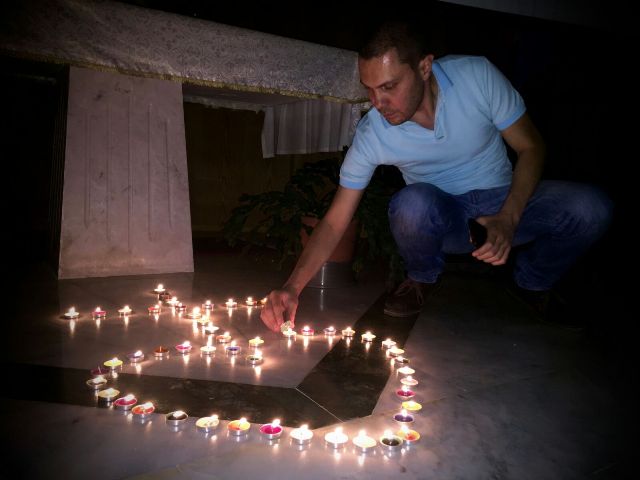 And we, the ones who believe in great ideals, in living peaceful and civil lives with respect for other cultures – do we truly believe it? And what price are we ready to pay? Frankly, the war in Syria is not a small matter. Who would have the courage to destroy a country that 6 years ago was growing with life and hope, where Muslims and Christians of different confessions and many other ethnic groups lived at peace with each other? Surely these destroyers are not single individuals. An answer by Chiara Lubich to some of our Muslim friends in 2002 came to mind. They had asked her about the hope that love and peace would win out over the war. She answered by citing the September 11th attacks: “Terrorism is a fruit of Evil (with a capital E) against which human strength will not suffice [. . .]. The forces of Good (with a capital G” are required [. . .] the forces of God’s Love. And so, what do we have to do? Prayer! We have to unite . . . all of us who are for universal brotherhood . . . unite to pray that terrorism will be overcome. And we can do it, because Jesus says that wherever two or more are gathered in His name, in His love, whatever they ask, will be done for them. And we are far more than two or three [. . .] Let us leave here with one idea: We are together, let us unite to pray. But that’s not enough. The main cause of terrorism is this indifference in front of a world that is half rich and half poor. They would like – and they’re not wrong in this – for there to be some communion of goods [. . .] some solidarity. We have to change hearts. Only if we carry out the work of universal brotherhood will we be able to convince ourselves and others that we should also put together our goods. We’ll begin amongst ourselves, but then the ideas begin to rise all the way to the Heads of State. We need to have this certainty: that with God, impossible things become possible; that with God – beginning with the brotherhood amongst us – we’ll reach the great goal: to make humanity one family [. . .]. This is our objective.”
And we, the ones who believe in great ideals, in living peaceful and civil lives with respect for other cultures – do we truly believe it? And what price are we ready to pay? Frankly, the war in Syria is not a small matter. Who would have the courage to destroy a country that 6 years ago was growing with life and hope, where Muslims and Christians of different confessions and many other ethnic groups lived at peace with each other? Surely these destroyers are not single individuals. An answer by Chiara Lubich to some of our Muslim friends in 2002 came to mind. They had asked her about the hope that love and peace would win out over the war. She answered by citing the September 11th attacks: “Terrorism is a fruit of Evil (with a capital E) against which human strength will not suffice [. . .]. The forces of Good (with a capital G” are required [. . .] the forces of God’s Love. And so, what do we have to do? Prayer! We have to unite . . . all of us who are for universal brotherhood . . . unite to pray that terrorism will be overcome. And we can do it, because Jesus says that wherever two or more are gathered in His name, in His love, whatever they ask, will be done for them. And we are far more than two or three [. . .] Let us leave here with one idea: We are together, let us unite to pray. But that’s not enough. The main cause of terrorism is this indifference in front of a world that is half rich and half poor. They would like – and they’re not wrong in this – for there to be some communion of goods [. . .] some solidarity. We have to change hearts. Only if we carry out the work of universal brotherhood will we be able to convince ourselves and others that we should also put together our goods. We’ll begin amongst ourselves, but then the ideas begin to rise all the way to the Heads of State. We need to have this certainty: that with God, impossible things become possible; that with God – beginning with the brotherhood amongst us – we’ll reach the great goal: to make humanity one family [. . .]. This is our objective.” 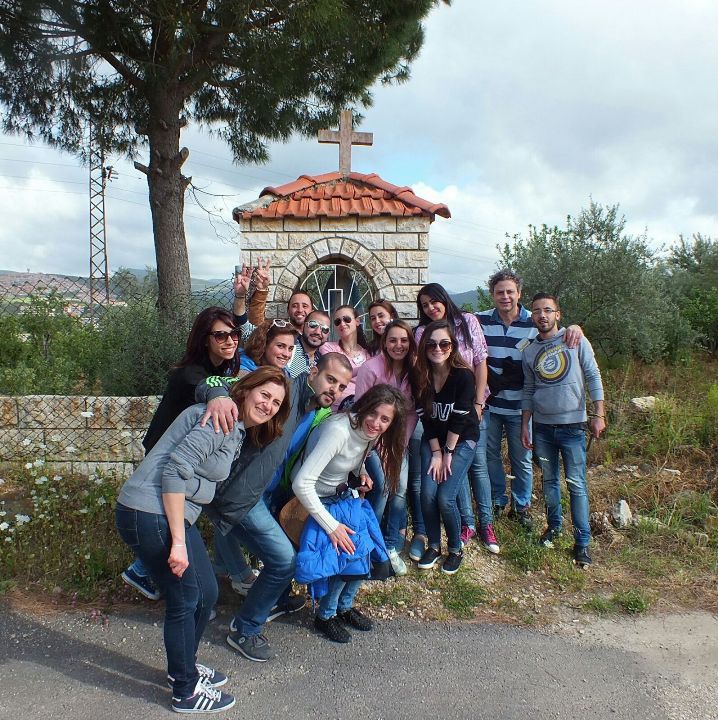 We shouldn’t delude ourselves. We shouldn’t wait for others to do something. We’re also responsible! If we truly believe that God can overcome Evil and that He listens to us, then we have to pray to the Father without ceasing, with the faith that He will help us; otherwise, we commit a sin of omission. Everybody remembers the time the bombings stopped over Syria, thanks to the influence of the prayer and fasting of the Pope and many others. And God heard us! And so He can hear us again. Let’s do it then – and always – until the reign of Peace comes not only in Syria, but in the whole world. See: Chiara Lubich, Castel Gandolfo, Italy, November 3, 2002, questions and answers with Muslim friends of the Focolare.
We shouldn’t delude ourselves. We shouldn’t wait for others to do something. We’re also responsible! If we truly believe that God can overcome Evil and that He listens to us, then we have to pray to the Father without ceasing, with the faith that He will help us; otherwise, we commit a sin of omission. Everybody remembers the time the bombings stopped over Syria, thanks to the influence of the prayer and fasting of the Pope and many others. And God heard us! And so He can hear us again. Let’s do it then – and always – until the reign of Peace comes not only in Syria, but in the whole world. See: Chiara Lubich, Castel Gandolfo, Italy, November 3, 2002, questions and answers with Muslim friends of the Focolare.
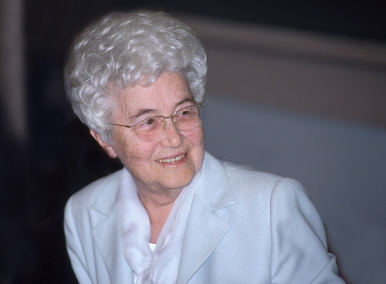
Chiara Lubich and her message of peace
 “A woman of dauntless faith, a meek messenger of hope and peace” – this is how Pope Benedict XVI described Chiara Lubich in his message at her funeral eight years ago. In January 2015, on the occasion of the official opening of the cause of her beatification, Pope Francis urged “to make known to the people of God the life and work of one who welcomed Our Lord’s invitation and enkindled a new light for the church on the journey towards unity”. Hundreds of initiatives held around the world remember her message of peace. The Focolare Community in Europe is promoting more than 200 events. “We live for Unity” is the title of the meeting in Minsk, Belarus. Meetings will held in the six cities where Focolare Communities are present in Sweden. In Munich, there will be the first “Chiaratag”. Journalists and qualified members of the Justice and Peace Commission will take part in the round table conference “Chiara and peace” held in Lisbon, Portugal. In Seville, Spain the theme will be “Chiara Lubich, educator for peace”. Allal Baschar, Imam of the Mosque of King Abdul Aziz al Saud of Marbella and Fr. Manuel Palma Ramírez, deputy director of the Seville Theological Studies Centre will be two speakers during this meeting. “A message of dialogue and peace” is the title of the meeting organized by the Focolare community in Sarajevo, Bosnia and Herzegovina. This Community, composed of Catholics, Orthodox, Muslims and people with no religious belief, will share the result of years of commitment lived side by side by its various members. The public is invited to attend, and Archbishop Cardinal Vinko Puljić is expected to participate. The firm belief in this message is passed through an ongoing dialogue, even in other Balkan countries, and it leads to mutual recognition of traditions and nationalities. Pearls, an educational programme carried out in Skopje, Macedonia shows this. It consists of an early childhood programme for children of various ethnic groups. It is linked to the university and also involves the families. Based on Lubich’s ideal of universal brotherhood, it was initiated by Professor Aziz Shehu, a Muslim who was then lecturer and pro-dean at the Faculty of Pedagogy. In early March, 110 young Croats, Serbs, Ruthenians, Albanians and Macedonians also gave witness of this irreversible process when, for the first time, with others from Bulgaria and Rumania, they came together under the banner, the Balkans: we are one Numerous meetings, symposia, conferences and concerts will be held in the Americas. These events vary from spiritual and prayerful to interfaith or environmental. They will take place from New York to San Francisco in U.S.A, from Santiago, Chile to La Habana, Cuba, Neza in the Mexican State of Nezahualcoyotl, Caracas in Venezuela, Rio de Janeiro in Brazil, Mendoza in Argentina. Very significant are the meetings to be held in the Pacific Islands of Honolulu, Hawaii, and in Noumea, New Caledonia. There is no family at Medellin, Colombia, who has not lost at least one of its members during these 50 years of conflict. So, even among the Focolare communities, one finds three generations with stories similar to that of Rosa, who had her son murdered by a friend but did not fall a victim of vengeance. She braved the situation with the courage of forgiveness while she worked in the social services centre of the neighbourhood to spread reconciliation, care, culture. Educational projects set up in different cities of Colombia, Ecuador, Venezuela and Mexico see generations of children grow up into professionals and teachers and assume the task of promoting an education that leads to fraternity and peace. Australia will focus on peace and fellowship, with appointments in Canberra, Melbourne, Sydney and Perth. The meeting in Perth, organized by youth, will be held in the central Northbridge Square.Politics for Unity: Making a World of Difference will be the theme for the conferences held in Wellington and in Christchurch, New Zealand. Thirty-one communities present in various regions of South Korea will animate the events that are meant to deepen the bond between Chiara Lubich and peace. The symposium at De La Salle University in Manila, the Philippines will focus on “The Charism of Unity: a timeless legacy” and delve into the Movement’s fifty years history in the continent of Asia. In Vietnam, 300 people from all over the country will be meeting in Vung Tau for several days to share and live together the spirituality of unity. In Pakistan, spiritual meetings and Masses for peace are to be held in seven cities. Events are also scheduled to take place in Burkina Faso, Ivory Coast, Cameroon, Nigeria, Kenya, Uganda and also in other places. Inspired by the current situation of social tension, Burundi choose the theme: Merciful like our Heavenly Father, we are builders of peace. A telephone conference call will unite, the big cities of the Democratic Rep. of Congo: Lubumbashi, Goma, Kinshasa and Kikwit. Here, 1500 people, among them ambassadors, members of UNESCO, representatives of different Christian denominations and Muslim authorities, will reflect on Peace in the family. The widespread presence of the Focolare communities in Italy stimulates numerous initiatives. In Rome, the meeting place for 280 young people will be the Italian Parliament where they will meet Laura Boldini, the president of the Italian Chamber of Deputies, Paolo Gentiloni, the Minister of foreign affairs and other members of Parliament. The three main speakers, who will discuss the manifesto containing concrete proposals on peace, disarmament and industrial reconversion are Pasquale Ferrara, a diplomat, Michele Zanzucchi, the director of Città Nuova and Shahrzad Houshmand, a Muslim theologian. Antonio M. Baggio will lecture to law students at the University of Pisa about: The love of loves. The religious and secular nature of politics in Chiara Lubich. “Religions dialogue in favour of peace and the environment” will be the event at the Palazzo Ducale in Genoa. During this event, Husein Salah, president of the Islamic Community, Giuseppe Momigliano, the chief Rabbi, Gnanathilaka Mahauswewe, a Buddhist monk, Andrea Ponta, an environmental engineer and Roberto Catalano from the Interreligious Diaolgue Centre of the Focolare Movement will give, a reflection on Laudato Si’. “Me through you” is the title of an itinerate event in Milan, which is a sort of “embrace” to the city and an interaction between different groups. There will be more dialogue, integration and forgiveness during the series of events “Is my world like yours?… steps towards getting to know one another better”. Members of the diplomatic Corps accredited to Italy and to the Holy See and representatives of the cultural world will meet at the Auditorium of the Mariapoli Centre at Castelgandolfo, Rome, where they will be welcomed by Maria Voce, president of the Focolare Movement. Chiara Lubich will be commemorated through The Culture of dialogue as a factor of peace. Whilst armed conflicts continue to cause havoc and kill hope in the Middle East, the Focolare communities in Syria affirm: “Even we are responsible to contribute towards peace. If we believe in God, the Lord of history who can conquer evil and hear our prayers, we would commit a sin of omission if we do not turn at all times to Him, who makes the impossible become possible and helps us to achieve our aim of uniting humanity into one family. So let us pray, while we change our hearts and share our goods”. The events of March 14, 2016 make sense because they aim at converging the efforts and prayers of many people, in many places on earth, to make the world become more united. Meanwhile, the cause of the beatification of Chiara Lubich, which began on January 27, 2015 is following the required process. Witness has already been offered by persons who are members of different Churches and by others who have no particular religious conviction. A mosaic of testimonies highlight her exemplary life, a commitment shared with all those whom God placed in her path to “become saints together”. Press Release
“A woman of dauntless faith, a meek messenger of hope and peace” – this is how Pope Benedict XVI described Chiara Lubich in his message at her funeral eight years ago. In January 2015, on the occasion of the official opening of the cause of her beatification, Pope Francis urged “to make known to the people of God the life and work of one who welcomed Our Lord’s invitation and enkindled a new light for the church on the journey towards unity”. Hundreds of initiatives held around the world remember her message of peace. The Focolare Community in Europe is promoting more than 200 events. “We live for Unity” is the title of the meeting in Minsk, Belarus. Meetings will held in the six cities where Focolare Communities are present in Sweden. In Munich, there will be the first “Chiaratag”. Journalists and qualified members of the Justice and Peace Commission will take part in the round table conference “Chiara and peace” held in Lisbon, Portugal. In Seville, Spain the theme will be “Chiara Lubich, educator for peace”. Allal Baschar, Imam of the Mosque of King Abdul Aziz al Saud of Marbella and Fr. Manuel Palma Ramírez, deputy director of the Seville Theological Studies Centre will be two speakers during this meeting. “A message of dialogue and peace” is the title of the meeting organized by the Focolare community in Sarajevo, Bosnia and Herzegovina. This Community, composed of Catholics, Orthodox, Muslims and people with no religious belief, will share the result of years of commitment lived side by side by its various members. The public is invited to attend, and Archbishop Cardinal Vinko Puljić is expected to participate. The firm belief in this message is passed through an ongoing dialogue, even in other Balkan countries, and it leads to mutual recognition of traditions and nationalities. Pearls, an educational programme carried out in Skopje, Macedonia shows this. It consists of an early childhood programme for children of various ethnic groups. It is linked to the university and also involves the families. Based on Lubich’s ideal of universal brotherhood, it was initiated by Professor Aziz Shehu, a Muslim who was then lecturer and pro-dean at the Faculty of Pedagogy. In early March, 110 young Croats, Serbs, Ruthenians, Albanians and Macedonians also gave witness of this irreversible process when, for the first time, with others from Bulgaria and Rumania, they came together under the banner, the Balkans: we are one Numerous meetings, symposia, conferences and concerts will be held in the Americas. These events vary from spiritual and prayerful to interfaith or environmental. They will take place from New York to San Francisco in U.S.A, from Santiago, Chile to La Habana, Cuba, Neza in the Mexican State of Nezahualcoyotl, Caracas in Venezuela, Rio de Janeiro in Brazil, Mendoza in Argentina. Very significant are the meetings to be held in the Pacific Islands of Honolulu, Hawaii, and in Noumea, New Caledonia. There is no family at Medellin, Colombia, who has not lost at least one of its members during these 50 years of conflict. So, even among the Focolare communities, one finds three generations with stories similar to that of Rosa, who had her son murdered by a friend but did not fall a victim of vengeance. She braved the situation with the courage of forgiveness while she worked in the social services centre of the neighbourhood to spread reconciliation, care, culture. Educational projects set up in different cities of Colombia, Ecuador, Venezuela and Mexico see generations of children grow up into professionals and teachers and assume the task of promoting an education that leads to fraternity and peace. Australia will focus on peace and fellowship, with appointments in Canberra, Melbourne, Sydney and Perth. The meeting in Perth, organized by youth, will be held in the central Northbridge Square.Politics for Unity: Making a World of Difference will be the theme for the conferences held in Wellington and in Christchurch, New Zealand. Thirty-one communities present in various regions of South Korea will animate the events that are meant to deepen the bond between Chiara Lubich and peace. The symposium at De La Salle University in Manila, the Philippines will focus on “The Charism of Unity: a timeless legacy” and delve into the Movement’s fifty years history in the continent of Asia. In Vietnam, 300 people from all over the country will be meeting in Vung Tau for several days to share and live together the spirituality of unity. In Pakistan, spiritual meetings and Masses for peace are to be held in seven cities. Events are also scheduled to take place in Burkina Faso, Ivory Coast, Cameroon, Nigeria, Kenya, Uganda and also in other places. Inspired by the current situation of social tension, Burundi choose the theme: Merciful like our Heavenly Father, we are builders of peace. A telephone conference call will unite, the big cities of the Democratic Rep. of Congo: Lubumbashi, Goma, Kinshasa and Kikwit. Here, 1500 people, among them ambassadors, members of UNESCO, representatives of different Christian denominations and Muslim authorities, will reflect on Peace in the family. The widespread presence of the Focolare communities in Italy stimulates numerous initiatives. In Rome, the meeting place for 280 young people will be the Italian Parliament where they will meet Laura Boldini, the president of the Italian Chamber of Deputies, Paolo Gentiloni, the Minister of foreign affairs and other members of Parliament. The three main speakers, who will discuss the manifesto containing concrete proposals on peace, disarmament and industrial reconversion are Pasquale Ferrara, a diplomat, Michele Zanzucchi, the director of Città Nuova and Shahrzad Houshmand, a Muslim theologian. Antonio M. Baggio will lecture to law students at the University of Pisa about: The love of loves. The religious and secular nature of politics in Chiara Lubich. “Religions dialogue in favour of peace and the environment” will be the event at the Palazzo Ducale in Genoa. During this event, Husein Salah, president of the Islamic Community, Giuseppe Momigliano, the chief Rabbi, Gnanathilaka Mahauswewe, a Buddhist monk, Andrea Ponta, an environmental engineer and Roberto Catalano from the Interreligious Diaolgue Centre of the Focolare Movement will give, a reflection on Laudato Si’. “Me through you” is the title of an itinerate event in Milan, which is a sort of “embrace” to the city and an interaction between different groups. There will be more dialogue, integration and forgiveness during the series of events “Is my world like yours?… steps towards getting to know one another better”. Members of the diplomatic Corps accredited to Italy and to the Holy See and representatives of the cultural world will meet at the Auditorium of the Mariapoli Centre at Castelgandolfo, Rome, where they will be welcomed by Maria Voce, president of the Focolare Movement. Chiara Lubich will be commemorated through The Culture of dialogue as a factor of peace. Whilst armed conflicts continue to cause havoc and kill hope in the Middle East, the Focolare communities in Syria affirm: “Even we are responsible to contribute towards peace. If we believe in God, the Lord of history who can conquer evil and hear our prayers, we would commit a sin of omission if we do not turn at all times to Him, who makes the impossible become possible and helps us to achieve our aim of uniting humanity into one family. So let us pray, while we change our hearts and share our goods”. The events of March 14, 2016 make sense because they aim at converging the efforts and prayers of many people, in many places on earth, to make the world become more united. Meanwhile, the cause of the beatification of Chiara Lubich, which began on January 27, 2015 is following the required process. Witness has already been offered by persons who are members of different Churches and by others who have no particular religious conviction. A mosaic of testimonies highlight her exemplary life, a commitment shared with all those whom God placed in her path to “become saints together”. Press Release
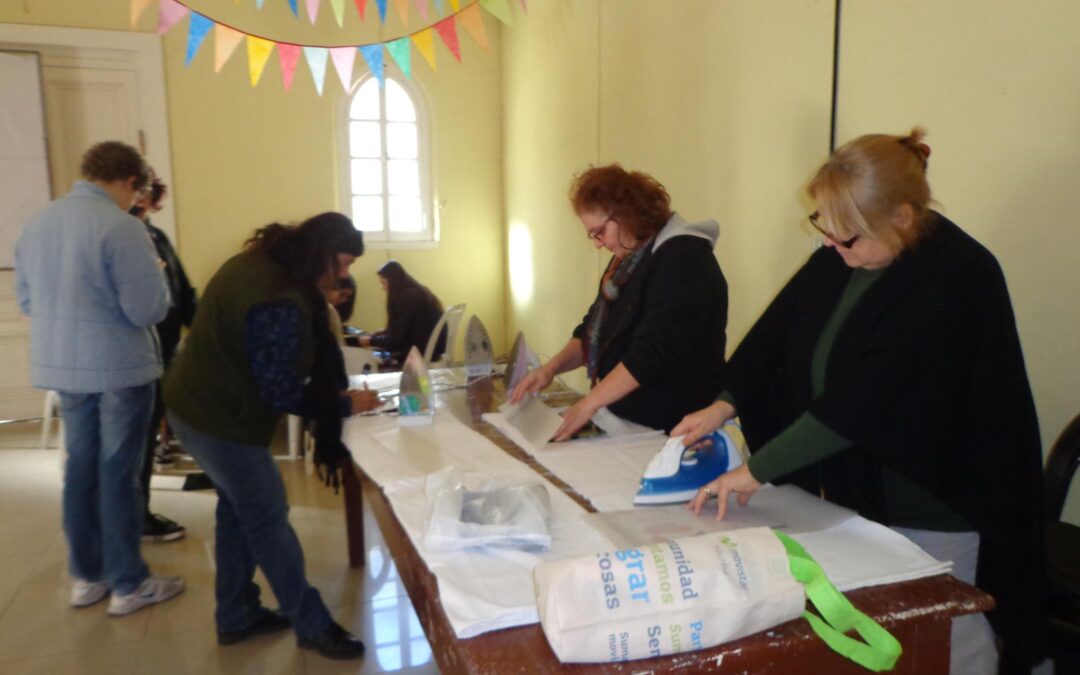
Argentina: a community at the outskirts
 From the Argentinean capital, if you take the south bound motorway, after half an hour you would get to Plátanos, a peripheral barrio of about 20,000 inhabitants. They are hardworking people who have built their own homes with great effort and very little money. The parish, dedicated to Saint Elisabeth of Hungary, is very active. Fr. Francesco Ballarini, Italian, brought the Focolare spirit there almost 30 years ago. Today, it is the lay people who continue to live this spirit of unity, together with other diocesan parishes. “At the start of the year – they recounted – we organised a party for the children of the most far out district of Plátanos, the inhabitants of which do not frequent the parish very much. Each of them was invited to put in common their own talents: some taught how to make bread, others how to paint, and there were a ceramics lab, a catechist dad to play magician, and some ladies who taught how to prepare mate (the typical infusion drunk in the Southern tip of the country).” On this occasion they met a 15-year-old at the end of her pregnancy. “She needed everything. A solidarity competition started in order to meet the needs of the child who was born a few days early. Upon reaching her house, we were shocked by the downgrade of the small place: without a floor or windows, a broken door, and with her six siblings living there with her parents. When the community heard about this situation, a lot of aid started coming in. We are almost ready to install the windows, doors, a heater and other people have offered to give a hand. Some ladies went to teach M. how to best take care of her baby, and M. who was sad and irritable when we first met her, has started to smile. It is the charity lived all together that works small miracles.”
From the Argentinean capital, if you take the south bound motorway, after half an hour you would get to Plátanos, a peripheral barrio of about 20,000 inhabitants. They are hardworking people who have built their own homes with great effort and very little money. The parish, dedicated to Saint Elisabeth of Hungary, is very active. Fr. Francesco Ballarini, Italian, brought the Focolare spirit there almost 30 years ago. Today, it is the lay people who continue to live this spirit of unity, together with other diocesan parishes. “At the start of the year – they recounted – we organised a party for the children of the most far out district of Plátanos, the inhabitants of which do not frequent the parish very much. Each of them was invited to put in common their own talents: some taught how to make bread, others how to paint, and there were a ceramics lab, a catechist dad to play magician, and some ladies who taught how to prepare mate (the typical infusion drunk in the Southern tip of the country).” On this occasion they met a 15-year-old at the end of her pregnancy. “She needed everything. A solidarity competition started in order to meet the needs of the child who was born a few days early. Upon reaching her house, we were shocked by the downgrade of the small place: without a floor or windows, a broken door, and with her six siblings living there with her parents. When the community heard about this situation, a lot of aid started coming in. We are almost ready to install the windows, doors, a heater and other people have offered to give a hand. Some ladies went to teach M. how to best take care of her baby, and M. who was sad and irritable when we first met her, has started to smile. It is the charity lived all together that works small miracles.”  “Another initiative we are working on – they continued – is the Sachetera project: it is about the manufacture of sleeping sacks with the milk bags, for the homeless. As a parish we want to continue supporting this project, and even each of us could work in their own homes. We prefer working together: kids, adolescents and adults. During a very rainy day, we thought it would be impossible to meet, but the thought of our homeless friends urged us to work even harder.” “We then gathered at Bernal (another barrio) with members of other parishes and the Focolare youth who brought ahead the aid project for the needy. For us it is important to share our experiences with other parishes, also so we would not enclose ourselves only in “our” periphery, and instead open out to the others.” In September, the house of a family in a nearby district burned down – destroying everything, “we started up an action aid, bringing the primary necessities from our own homes. With the communion of goods we contributed to the building of the walls. So with great enthusiasm, they were able to rebuild their house. Only much later, we found out that the family belongs to the Pentecostal church, and that he was the Pastor. We were moved since Love did not consider, once again, one’s religious profession, or other differences.» In the following days, the Pastor who worked as a mason, offered to plaster the wall of the church which wanted to build an altar for the icon of the Virgin of Luján. «I thank you all for the love you gave me, without asking anything in return – the Pastor said to the Catholic community gathered for the Sunday mass, and which they wanted to take part in – you have helped me overcome the prejudices that many of us (Pentecostals) feel towards Catholics. You too are my brothers.”
“Another initiative we are working on – they continued – is the Sachetera project: it is about the manufacture of sleeping sacks with the milk bags, for the homeless. As a parish we want to continue supporting this project, and even each of us could work in their own homes. We prefer working together: kids, adolescents and adults. During a very rainy day, we thought it would be impossible to meet, but the thought of our homeless friends urged us to work even harder.” “We then gathered at Bernal (another barrio) with members of other parishes and the Focolare youth who brought ahead the aid project for the needy. For us it is important to share our experiences with other parishes, also so we would not enclose ourselves only in “our” periphery, and instead open out to the others.” In September, the house of a family in a nearby district burned down – destroying everything, “we started up an action aid, bringing the primary necessities from our own homes. With the communion of goods we contributed to the building of the walls. So with great enthusiasm, they were able to rebuild their house. Only much later, we found out that the family belongs to the Pentecostal church, and that he was the Pastor. We were moved since Love did not consider, once again, one’s religious profession, or other differences.» In the following days, the Pastor who worked as a mason, offered to plaster the wall of the church which wanted to build an altar for the icon of the Virgin of Luján. «I thank you all for the love you gave me, without asking anything in return – the Pastor said to the Catholic community gathered for the Sunday mass, and which they wanted to take part in – you have helped me overcome the prejudices that many of us (Pentecostals) feel towards Catholics. You too are my brothers.”
